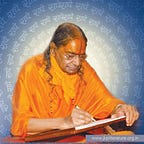The Aim of Life
There is a question that I am sure many of you have asked. Why am I here? In other words, what is it that we want and how do we get it? Isn’t it surprising that we have not been able to answer this simple question despite our countless lifetimes. Many of us consider ourselves to be well educated too, and yet if someone says otherwise, we feel offended. But the fact is that we do not know everything, and we are ignorant of a great many things, even in this world, not to mention the spiritual one. Our lack of understanding explains why we are miserable, why we feel troubled, dissatisfied, tense, and incomplete. The Saints go so far as to say that even though we are human, the most sought-after form of the 8.4 million species of life, we are worse than animals. It stands to reason, therefore, that we find out and deeply understand the correct answer to this question.
Some of you may be thinking that there must be countless answers to it. One person wants one thing, and another person wants something else. But this is not so. The scriptures say that every living being wants only one thing: anand or bliss; happiness. A person may be an atheist or a theist, he may be from any country, and he may speak any language, and yet, all sentient and insentient beings want only bliss. Every living being desires only happiness, and without being told to do so by anyone!
Just consider what happens when we are born. What is the first thing a baby does? It cries. Do you know why it cries? By crying the baby declares that it wants happiness. In other words, I no longer want the pain I experienced while taking birth. I want to be happy. Since then, we have worked at accumulating degrees and we have become highly qualified, we have become wealthy, and we have gained some level of prestige and position in society. But have we attained happiness? Ask yourself. No. We have not. How do we know this? Because we are constantly striving for it. The reason behind everything we do is to feel happy. But the happiness we experience from the world fluctuates, it comes and goes. We all know this to be true. This is our life experience. However, when we speak to one another we conceal this reality. When someone asks, “How are you?” what do you say? “Alright!” All right? Are you really alright? The Saints say not even a single thing about us is right; everything is wrong. In fact, we do not even know the definition of happiness.
All questions regarding happiness are answered in the Vedas. Let us begin by answering the very first one: what is happiness? The Vedas explain:
yo vai bhuma tatsukham . . . (Chhandogya Upanishad 7.23.1) “That which is infinite in nature and everlasting is called bliss.”
We experience happiness from our parents, spouse, siblings, friends and from what we see, hear, taste, touch and smell in the world. But this happiness is limited and only lasts for a short time before diminishing. It is soon replaced by unhappiness. Then, after a while, we experience a little happiness from something else, and then that too disappears. According to the scriptures, this is not what happiness is like. Happiness is unlimited and everlasting. Why do we want happiness like this? The answer to this question is also given in the Vedas:
anando brahmeti vyajanat . . . (Taittiriya Upanishad 3.6) “God is bliss personified.”
There is a personality known as Bhagavan. He is also referred to as God, Khuda, and so on. There is another name for Him too, and that is anand, bliss.
raso vai sah (Taittiriya Upanishad 2.7) “God alone is bliss.”
mamaivamsho jivaloke jivabhutah sanatanah (Gita 15.7) “Every individual soul is an eternal part of God.”
ishvara amsha jiva avinashi (Ramayana) “All individual living beings are fractions of God.”
What does this mean? Every part has a natural desire for its whole. Being a fraction or part of bliss, the individual soul desires it. We want unlimited and ever-increasing happiness. In other words, we want God. This is why Valmiki says,
loke nahi sa vidyeta yon a ramamanuvratah (Valmiki Ramayana) “There cannot be anyone in the world who does not believe in God.”
But what about an atheist? No one can be an atheist. Why? If you ask a so-called atheist what he wants, he will say that he wants to be happy too. Happiness is another name for God; it is a synonym for God. You say that you want happiness and I say I want God — both of us want the same thing. You can call someone your father or your mother’s husband, what difference does it make? In the same way, everyone desires happiness and therefore everyone desires God.
To be continued …
Kripalu Bhaktiyoga Tattvadarshan — the essence of Vedic wisdom, spirituality and devotion in daily life
